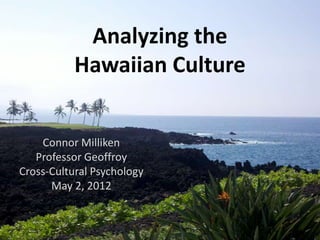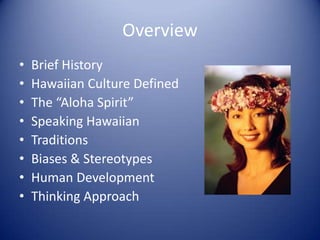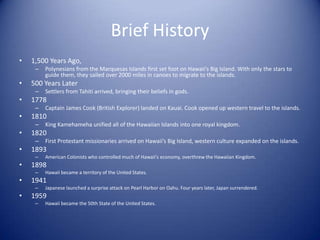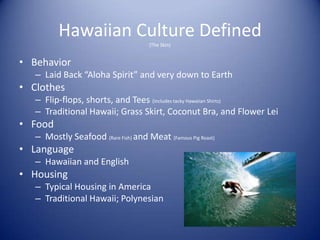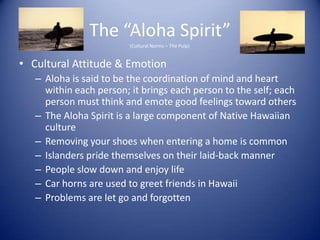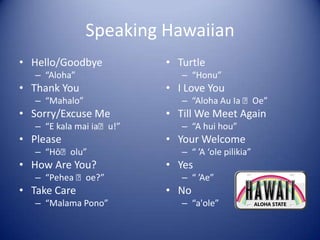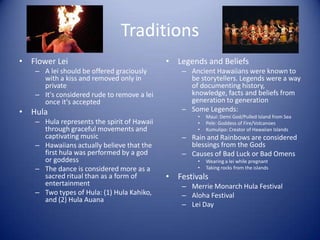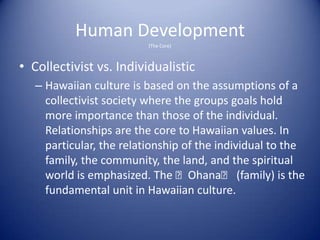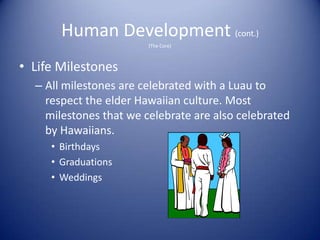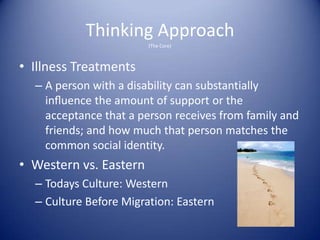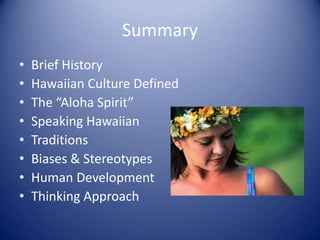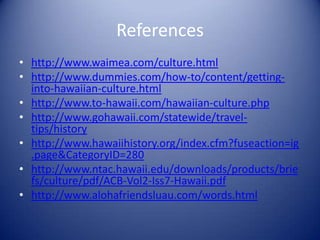Hawaiian Culture Analysis
- 1. Analyzing the Hawaiian Culture Connor Milliken Professor Geoffroy Cross-Cultural Psychology May 2, 2012
- 2. Overview âĒ Brief History âĒ Hawaiian Culture Defined âĒ The âAloha Spiritâ âĒ Speaking Hawaiian âĒ Traditions âĒ Biases & Stereotypes âĒ Human Development âĒ Thinking Approach
- 3. Brief History âĒ 1,500 Years Ago, â Polynesians from the Marquesas Islands first set foot on Hawaii's Big Island. With only the stars to guide them, they sailed over 2000 miles in canoes to migrate to the islands. âĒ 500 Years Later â Settlers from Tahiti arrived, bringing their beliefs in gods. âĒ 1778 â Captain James Cook (British Explorer) landed on Kauai. Cook opened up western travel to the islands. âĒ 1810 â King Kamehameha unified all of the Hawaiian Islands into one royal kingdom. âĒ 1820 â First Protestant missionaries arrived on Hawaiiâs Big Island, western culture expanded on the islands. âĒ 1893 â American Colonists who controlled much of Hawaii's economy, overthrew the Hawaiian Kingdom. âĒ 1898 â Hawaii became a territory of the United States. âĒ 1941 â Japanese launched a surprise attack on Pearl Harbor on Oahu. Four years later, Japan surrendered. âĒ 1959 â Hawaii became the 50th State of the United States.
- 4. Hawaiian Culture Defined (The Skin) âĒ Behavior â Laid Back âAloha Spiritâ and very down to Earth âĒ Clothes â Flip-flops, shorts, and Tees (includes tacky Hawaiian Shirts) â Traditional Hawaii; Grass Skirt, Coconut Bra, and Flower Lei âĒ Food â Mostly Seafood (Rare Fish) and Meat (Famous Pig Roast) âĒ Language â Hawaiian and English âĒ Housing â Typical Housing in America â Traditional Hawaii; Polynesian
- 5. The âAloha Spiritâ (Cultural Norms â The Pulp) âĒ Cultural Attitude & Emotion â Aloha is said to be the coordination of mind and heart within each person; it brings each person to the self; each person must think and emote good feelings toward others â The Aloha Spirit is a large component of Native Hawaiian culture â Removing your shoes when entering a home is common â Islanders pride themselves on their laid-back manner â People slow down and enjoy life â Car horns are used to greet friends in Hawaii â Problems are let go and forgotten
- 6. Speaking Hawaiian âĒ Hello/Goodbye âĒ Turtle â âAlohaâ â âHonuâ âĒ Thank You âĒ I Love You â âMahaloâ â âAloha Au Ia ĘŧOeâ âĒ Sorry/Excuse Me âĒ Till We Meet Again â âE kala mai iaĘŧu!â â âA hui houâ âĒ Please âĒ Your Welcome â âHÅĘŧoluâ â â âA âole pilikiaâ âĒ How Are You? âĒ Yes â âPehea Ęŧoe?â â â âAeâ âĒ Take Care âĒ No â âMalama Ponoâ â âa'oleâ
- 7. Traditions âĒ Flower Lei âĒ Legends and Beliefs â A lei should be offered graciously â Ancient Hawaiians were known to with a kiss and removed only in be storytellers. Legends were a way private of documenting history, â It's considered rude to remove a lei knowledge, facts and beliefs from once it's accepted generation to generation âĒ Hula â Some Legends: âĒ Maui: Demi God/Pulled Island from Sea â Hula represents the spirit of Hawaii âĒ Pele: Goddess of Fire/Volcanoes through graceful movements and âĒ Kumulipo: Creator of Hawaiian Islands captivating music â Rain and Rainbows are considered â Hawaiians actually believe that the blessings from the Gods first hula was performed by a god â Causes of Bad Luck or Bad Omens or goddess âĒ Wearing a lei while pregnant â The dance is considered more as a âĒ Taking rocks from the islands sacred ritual than as a form of âĒ Festivals entertainment â Merrie Monarch Hula Festival â Two types of Hula: (1) Hula Kahiko, â Aloha Festival and (2) Hula Auana â Lei Day
- 8. Human Development (The Core) âĒ Collectivist vs. Individualistic â Hawaiian culture is based on the assumptions of a collectivist society where the groups goals hold more importance than those of the individual. Relationships are the core to Hawaiian values. In particular, the relationship of the individual to the family, the community, the land, and the spiritual world is emphasized. The ĘŧOhanaĘŧ (family) is the fundamental unit in Hawaiian culture.
- 9. Human Development (cont.) (The Core) âĒ Life Milestones â All milestones are celebrated with a Luau to respect the elder Hawaiian culture. Most milestones that we celebrate are also celebrated by Hawaiians. âĒ Birthdays âĒ Graduations âĒ Weddings
- 10. Thinking Approach (The Core) âĒ Illness Treatments â A person with a disability can substantially inïŽuence the amount of support or the acceptance that a person receives from family and friends; and how much that person matches the common social identity. âĒ Western vs. Eastern â Todays Culture: Western â Culture Before Migration: Eastern
- 11. Summary âĒ Brief History âĒ Hawaiian Culture Defined âĒ The âAloha Spiritâ âĒ Speaking Hawaiian âĒ Traditions âĒ Biases & Stereotypes âĒ Human Development âĒ Thinking Approach
- 12. Questions
- 13. References âĒ http://www.waimea.com/culture.html âĒ http://www.dummies.com/how-to/content/getting- into-hawaiian-culture.html âĒ http://www.to-hawaii.com/hawaiian-culture.php âĒ http://www.gohawaii.com/statewide/travel- tips/history âĒ http://www.hawaiihistory.org/index.cfm?fuseaction=ig .page&CategoryID=280 âĒ http://www.ntac.hawaii.edu/downloads/products/brie fs/culture/pdf/ACB-Vol2-Iss7-Hawaii.pdf âĒ http://www.alohafriendsluau.com/words.html
- 14. Side-Note for Professor âĒ Hey Professor, I just wanted to write this little note to thank you for a wonderful class experience. I have taken several online classes and have truly felt that this class has given me a different outlook on life and will benefit me in my life journey. Your lessons showed me that there is more to life than what people may think and that we must accept each other culturally because even though we may come from separate cultures, we all have many ideals in common that bring us all together. I feel touched to have been able to learn from you as a student. Thank you so much for this wonderful experience, I hope to take another class with you before I graduate (hopefully in class too), and will hopefully meet you too! Thank You!!
